Related Research Articles

Maurice Ernest Gibb was a British musician, singer, songwriter and record producer who achieved fame as a member of the Bee Gees. Although his elder brother Barry Gibb and fraternal twin brother Robin Gibb were the group's main lead singers, most of their albums included at least one or two songs featuring Maurice's lead vocals, including "Lay It on Me", "Country Woman" and "On Time". The Bee Gees were one of the most successful rock-pop groups of all time.
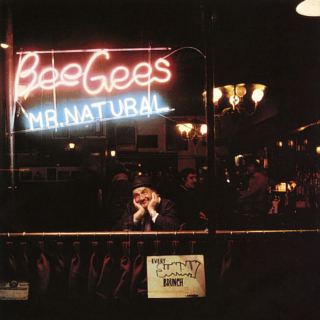
Mr. Natural is the Bee Gees' twelfth album, released in July 1974. It was the first Bee Gees release to be produced by Arif Mardin, who was partially responsible for launching the group's later major success with the follow-up album Main Course. The album's music incorporates more rhythm and blues, soul and funk and hard rock than their previous albums. The cover photograph was taken at 334 West 4th Street, Greenwich Village, New York City by Frank Moscati.

Size Isn't Everything is the twentieth studio album by the Bee Gees, released in the UK on 13 September 1993, and the US on 2 November of the same year. The brothers abandoned the contemporary dance feel of the previous album High Civilization and went for what they would describe as "A return to our sound before Saturday Night Fever".

"Night Fever" is a song written and performed by the Bee Gees. It first appeared on the soundtrack to Saturday Night Fever on RSO Records. Producer Robert Stigwood wanted to call the film Saturday Night, but singer Robin Gibb expressed hesitation at the title. Stigwood liked the title Night Fever but was wary of marketing a movie with that name. The song bounded up the Billboard charts while the Bee Gees two previous hits from Saturday Night Fever soundtrack were still in the top ten. The record debuted on the Billboard Hot 100 Chart at #76, then leaped up 44 positions to #32. It then moved: 32–17–8–5–2–1. It remained at #1 for eight weeks, and ultimately spent 13 weeks in the top 10. For the first five weeks that "Night Fever" was at #1, "Stayin' Alive" was at #2. Also, for one week in March, Bee Gees related songs held five of the top positions on the Hot 100 chart, and more impressively, four of the top five positions, with "Night Fever" at the top of the list. The B-side of "Night Fever" was a live version of "Down the Road" taken from the Bee Gees 1977 album, Here at Last... Bee Gees... Live.
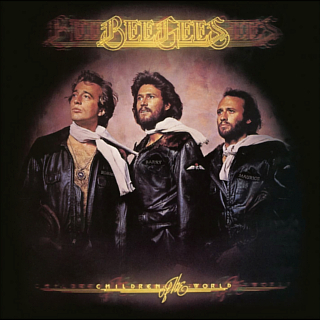
Children of the World is a 1976 album by the Bee Gees. The first single, "You Should Be Dancing", went to No. 1 in the US and Canada, and was a top ten hit in numerous other territories. The album has sold over 2.5 million copies. It was the group's fourteenth album. The album was re-issued on CD by Reprise Records and Rhino Records in 2006. This was the first record featuring the Gibb-Galuten-Richardson production team which would have many successful collaborations in the following years.

The Bee Gees Sing and Play 14 Barry Gibb Songs is the debut studio album by the Bee Gees. It was released in November 1965 on the Australian Leedon label. It is a compilation of most of the Gibb brothers' singles that had been released over the previous three years in Australia, which accounts for the many different styles of music on it.

To Whom It May Concern is the tenth album by the Bee Gees. Released in October 1972, it is the follow-up to, and continues the melancholic and personal sound of, its predecessor Trafalgar. The album was recognised as "a farewell to the old Bee Gees" as the album marked the end of an era for the group in several ways: it was their last album to be recorded solely at IBC Studios, in London, their last with conductor and arranger Bill Shepherd, who had guided them since 1967, and their last under their first contract with Robert Stigwood. Some of the songs were old ones finished or rewritten for the occasion. To Whom It May Concern has sold approximately 350,000 copies worldwide.

Life in a Tin Can is the Bee Gees' eleventh studio album, released in January 1973. The Bee Gees travelled to Los Angeles to record Life in a Tin Can. However, it was unable to prevent a commercial decline with the album criticised for a lack of innovation. Despite its low sales and poor chart performance, Life in a Tin Can was awarded "Album of the Year" by Record World magazine. It was the first Bee Gees album to bear the RSO label in the US.
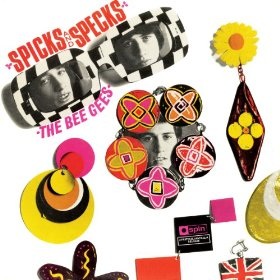
Spicks and Specks is the second studio album by the Bee Gees. It was released in November 1966, on Spin. Primarily written by Barry Gibb, the album features the first Robin Gibb composition "I Don't Know Why I Bother With Myself" and a Maurice Gibb composition "Where Are You".
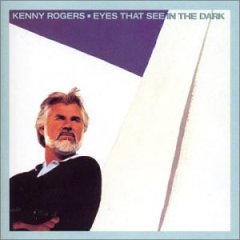
Eyes That See in the Dark is the 15th studio album by Kenny Rogers, first released by RCA Records in August 1983.

"The Battle of the Blue and the Grey" is a debut single by the Bee Gees, backed by "The Three Kisses of Love" and released on March 22, 1963. Like all the Bee Gees' output prior to 1967 it was only released in Australia. It was performed in Australian television Bandstand, the footage of that performance still exists. It reached #93 in Australia.

"Peace of Mind" is a song by the Bee Gees, released in Australia as their third in March 1964 and backed with "Don't Say Goodbye".
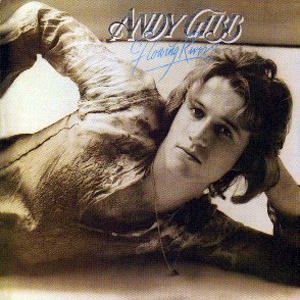
Flowing Rivers is the debut studio album by English singer-songwriter Andy Gibb. The album was produced by Albhy Galuten and Karl Richardson, with Barry Gibb on two tracks. It was released in September 1977 on RSO. Flowing Rivers was re-released by Polydor Records in 1998 in CD version.
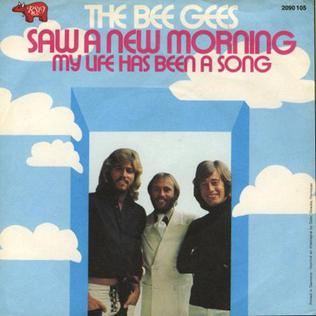
"Saw a New Morning" is the 1973 single released by the Bee Gees. It was also the group's first single released on Robert Stigwood's newly created records label RSO Records. The Bee Gees moved to Los Angeles in 1972 to record the album Life in a Tin Can which was a new direction for the group, who had been recording in England since 1967. The B-side, "My Life Has Been a Song" features lead vocal by Robin Gibb as well as Barry Gibb.
"Bury Me Down By the River" is a song written by Barry and Maurice Gibb and recorded separately by the Bee Gees and P.P. Arnold. The Bee Gees' version was recorded in May 1969 at IBC Studios and released in April 1970 on the album Cucumber Castle.
"Kitty Can" is a song by the Bee Gees, composed by Barry, Robin & Maurice Gibb. It was released as the B-side of "I've Gotta Get a Message to You" in July 1968, and as the second track on the album Idea in September 1968. In 1973, RSO Records released a compilation called Kitty Can only in Argentina and Uruguay, and this song appeared as the first track on that album.

"Lamplight" is a song by the Bee Gees, released as the B-side of "First of May", but featured as the single's A-side in Germany. It also featured on their double album Odessa in March 1969. The song was written and composed by Barry, Robin & Maurice Gibb and featured lead vocals by Robin Gibb. No other singles were released from the album, and the fact that the group's manager Robert Stigwood chose "First of May", which only featured Barry Gibb's voice for the A-side, that caused Robin to quit the group.
"Sweetheart" is a song released by the Bee Gees, released as the B-side of "I.O.I.O." in March 1970. and released on the album Cucumber Castle in April 1970.

"You Wouldn't Know" is a song written by Barry Gibb which was recorded by the Bee Gees and released as the B-side of their version of "Everyday I Have to Cry" and later included on the album The Bee Gees Sing and Play 14 Barry Gibb Songs (1965). The album of the same name was released in Europe by Tring Records and features the Bee Gees songs from 1963-1966.

"Timber!" is a song recorded by the Bee Gees, written by Barry Gibb. The song was released in Australia as their second single in July 1963, backed with "Take Hold of That Star". It was later included on the group's first album The Bee Gees Sing and Play 14 Barry Gibb Songs.
References
- ↑ "The Three Kisses of Love" by Bee Gees at Allmusic
- 1 2 Brennan, Joseph. "Gibb Songs: 1963" . Retrieved 7 December 2013.
- ↑ Brennan, Joseph. "Gibb Songs: 1946–1962" . Retrieved 7 December 2013.
- ↑ Andrew Hughes (2009). The Bee Gees – Tales of the Brothers Gibb. ISBN 9780857120045 . Retrieved 7 December 2013.